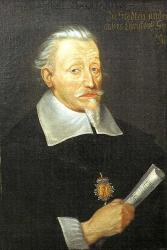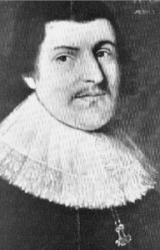Planning worship?
Check out our sister site, ZeteoSearch.org,
for 20+ additional resources related to your search.
- |
User Links
Person Results
Heinrich Schütz

1585 - 1672 Person Name: Heinrich Schütz, 1585-1672 Topics: The Annunciation of Our Lord Composer of "ICH HEB MEIN AUGEN SEHNLICH AUF" in Lutheran Book of Worship Heinrich Schütz (baptized Oct. 9, 1585-1672) was the greatest German composer of the seventeenth century and the first to reach international prominence. His influence was felt for more than two centuries after his death.
In 1598, after hearing the young Henrich sing, the Landgrave Moritz of Hessen-Kassel began a campaign to have the boy study at Kassel. In 1599, Christoph Schütz took his son to the landgrave’s seat, where he served as a choirboy and pursued his education showing particular facility in Greek, Latin, and Frence. After he lost his treble voice, he set out for the University of Marburg, where he studied law. But under the sponsorship of the landgrave, Heinrich went to Venice (1609) and studied with Giovanni Gabrieli until Gabrieli’s death in 1612. In 1613 he returned to Germany, once again studying law while serving as organist to the landgrave. He was lent to Johann Georg I of Saxony (1614) and subsequently became director of the chapel, a position he held the rest of his life. The untimely death of his wife after six years of marriage (1625) led him to devote himself to the composition of church music. After several petitions Schütz was granted leave to study with Claudio Monteverdi and once again set out for Venice. For much of his life the Thirty Years’ War obstructed his work, and he spent time moving from court to court in Europe, finally settling in Dresden in 1641, where he died.
--The Presbyterian Hymnal Companion, 1993
Heinrich Schütz
Gregory Norbet
b. 1940 Person Name: Gregory Norbet, b. 1940 Topics: The Liturgical Year The Annunciation of the Lord (March 25) Author of "Ave Maria" in Glory and Praise (3rd. ed.)
Gregory Norbet
Henry Lawes

1596 - 1662 Person Name: Henry Lawes, 1596-1662 Topics: The Annunciation March 25th Composer of "FARLEY CASTLE" in The New English Hymnal Born: January 5, 1596, Dinton, Wiltshire, England.
Died: October 21, 1662, London, England.
Buried: In the cloisters of Westminster Abbey, London, England.
Lawes, tutor to the daughters of the Earl of Bridgewater, is best known as a composer. He became a Gentleman of the Chapel Royal in 1626, and a member of the "King’s Musick" in 1631. He wrote over 400 vocal pieces, as well as anthems and instrumental compositions. His works include:
Choice Psalmes Put into Musick for Three Voices, 1648
Ayres and Dialogues (London: 1653)
Sources:
Frost, p. 680
Hughes, pp. 467-68
Nutter, p. 460
Stulken, p. 292
--www.hymntime.com/tch
Henry Lawes
Madeleine Forell Marshall
b. 1946 Topics: The Annunciation; Year A Annunciation; Year B Annunciation; Year C Annunciation Translator of "Beautiful Jesus" in The New Century Hymnal
Madeleine Forell Marshall
Hans Chr. Sthen
1544 - 1610 Person Name: H. C. Sthen Topics: Annunciation High Mass Translator of "Af Høiheden oprunden er" in M. B. Landstads Kirkesalmebog og "Nokre Salmar" ved Professor Dr. E. Blix, samt følgende tillæg
Hans Chr. Sthen
Elisabeth Creutziger
1500 - 1535 Person Name: Elizabet Creutziger Topics: Annunciation High Mass; Annunciation For Evening Author of "Gud Faders Søn enbaarne" in M. B. Landstads Kirkesalmebog og "Nokre Salmar" ved Professor Dr. E. Blix, samt følgende tillæg Cruciger, Elisabethe, née von Meseritz, was the daughter of a family belonging to the Polish nobility. Her parents, suffering from the persecutions of these times, had been forced to seek refuge at Wittenberg There, in May or June, 1524, she was married to Caspar Cruciger, son of a Leipzig burgess, who had enrolled himself as a student at Wittenberg in 1522. Cruciger, who was treated by Luther as his own son and accounted his most hopeful pupil, became in 1525 Rector of St. John’s School and preacher in St. Stephen's Church, Magdeburg; and in 1528 was called to become professor in the philosophical faculty at Wittenberg, but, by Luther's wish, was appointed one of the professors of Theology. Of his wife, who died at Wittenberg, May, 1535, little is known save that she was a friend of Luther's wife, a lover of music, and an affectionate wife and mother (Koch, i. 281-285; Caspar Cruciger, by Dr. Pressel, Elberfeld,1862, p. 76; Allg. Deutsche Biographie, xviii. 148, &c). The only hymn known as by her is:—
Herr Christ, der einig Gotts Sohn. Christmas, first published in Eyn Enchiridion, Erfurt, 1524. In the Geistliche Lieder, Wittenberg, 1531, it is given as "Ein geistlich liedt von Christo, Elisabet Creutzigerin," and from the Rostock Gesang-Buch, 1531, it seems clear that in King's Gesang-Buch, Wittenberg, 1529, it bore the same title. Wackernagel , iii. pp. 46-47, gives four forms, all in 5 stanzas of 7 lines. In the Unverfälschter Liedersegen, 1851, No. 37.
Koch, i., 282, calls it "a sublime hymn fully embracing in itself the true power of the Gospel." It has been ascribed to Andreas Knopken, but for this external evidence is entirely wanting, and in the Riga Kirchenordnung, 1537, in which his hymns appeared, this hymn is ascribed to E. Cruciger. That he as a theologian might fitly have written a hymn such as this, displaying power of theological expression (cf. st. v.) and knowledge of Latin (cf. st. i. with Prudentius's "Corde natus ex parentis") may be granted, but ladies learned in Latin and theology were not unknown in those days.
Translations in common use:—
1. The only Son from heaven. A good translation of stanzas i.-iii., by A. T. Russell, as No. 41 in his Psalms & Hymns, 1851, repeated, with alterations, as No. 119 in Kennedy, 1863.
2. O Thou, of God the Father. A translation of stanzas i., iii., iv., by Miss Winkworth, as No. 155 in her Chorale Book for England , 1863, and thence as No. 277 in the Ohio Lutheran Hymnal, 1880.
Translations not in common use:—
(1) "Christ is the only Sonne of God," by Bp. Coverdale, 1539, (Remains, 1846, p. 553). Almost identical with (2) "Christ is the onlie Son of God," in the Gude and Godly Ballates (ed. 1567-8, folio 74), ed. 1868, p. 127. (3) "Lord Christ the eternal Father's” in the Supplement to German Psalmody, ed. 1765, p. 3. (4) "Christ, that only begotten," as No. 335 in pt. i. of the Moravian Hymn Book, 1754. (5) "Thou Maker of each creature," No. 193 in the Moravian Hymn Book, 1789, is st. iii., iv. of the 1754, rewritten by P. H. Molther. In later editions a translation of st. vi. of "Herr Jesu, Gnadensonne" (see L. A. Gotter, No. i.) was added. [Rev. James Mearns, M.A.]
--John Julian, Dictionary of Hymnology (1907)
Elisabeth Creutziger
Millicent D. Kingham
1866 - 1927 Person Name: Millicent D. Kingham (1866-1927) Topics: Advent 4 The Annunciation Composer of "BENSON" in Hymns for Today's Church (2nd ed.)
Millicent D. Kingham
Kermit Moldenhauer
b. 1949 Person Name: Kermit G. Moldenhauer Topics: Annunciation of our Lord Composer of "[My heart is stirred by a noble theme]" in Christian Worship
Kermit Moldenhauer
Edward Elgar
Person Name: Edward Elgar, 1857-1934 Topics: The Liturgical Year The Annunciation of the Lord (March 25) Composer of "DRAKES BROUGHTON" in Journeysongs (3rd ed.)
Edward Elgar
Bartholomaüs Helder
1585 - 1635 Person Name: Barthold Helder Topics: Feast of the Annunciation Author of "Der Engel zu Maria kömmt" in Evangelisch-Lutherisches Gesang-Buch Helder, Bartholomäus, son of Johann Helder, Superintendent in Gotha, became, in 1607, schoolmaster at Friemar, and in 1616, pastor of Bemstadt, near Gotha, where he died of the pestilence, Oct. 28, 1635 (Koch, iii. 114, 115, 248; Allgemeine Deutsche Biographie, xi. 684, 685, &c).
Helder published two works (both in the Royal Library, Berlin). (1) Cymbalum Genethliacum. Erfurt, 1615 ; and (2) Cymbalum Davidicum. Erfurt, 1620. The first contains 15 Christmas and New Year Hymns, and the second 25, mostly Psalm versions. In the Cantionale Sacrum, Gotna, 1646-48, over 50 hymns are given with his name as composer of the music and without definite ascription as regards the words.
Two of these have passed into English, viz.:—
i. In meiner Noth ruf ich zu dir. Supplication. A prayer for grace, which appeared in the Cantionale Sacrum, pt. ii., Gotha, 1648, No. 71, in 3 st. of 6 1. Translated by Miss Manington, 1863, p. 1, as "From out my woe I cry to Thee."
ii. O Lämmlein Gottes, Jesu Christ. St. John Baptist's Day. Founded on St. John i. 29. Appeared as No. 103 in the Cantionale Sacrum, Gotha, 1646, in 4 stanzas of 4 lines, entitled, "On St. John's Day." Included as No. 391 in the Unverfälschter Liedersegen. 1851. The only translation in common use is "O Jesus, Lamb of God, who art," in full, by A. Crull, as No. 120 in the Ohio Lutheran Hymnal, 1880. [Rev. James Mearns, M.A.]
--John Julian, Dictionary of Hymnology (1907)
Bartholomaüs Helder


 My Starred Hymns
My Starred Hymns

